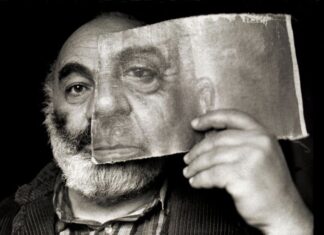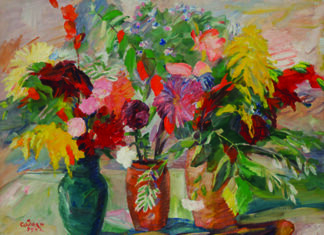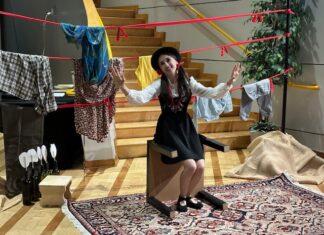Special to the Mirror-Spectator
German-Turkish-Armenian Project Dramatizes Search for Identity
BERLIN — Her name is Sabiha, the same name as the favorite adopted daughter of Kemal Mustafa (Atatürk), who as a female pilot was a symbol for her nation. But this Sabiha is German, and lives with her immigrant mother, whom she calls Anne — “mother” in Turkish. This Sabiha, we learn from her best friend (actually soul mate), also named Anne, is 150-percent German, and only learns Turkish when she attends university. She soon feels drawn to Turkish nationalist circles, and even participates in nationalist demonstrations, honoring Talaat Pasha, for example.
But who is Sabiha really? Is she German? Is she Turkish? Or is she, perhaps, something else? Could she be Armenian?
This is the question posed by a new play whose debut took place in Berlin at the Theater unterm Dach (Theatre under the Loft) in October. Composed by the well-known German-Turkish author and activist Dogan Akhanli, the play, titled “Anne’s Silence,” is a monologue, brilliantly performed by Bea Ehlers-Kerbekian, of Armenian descent, and directed with startlingly-modern creative insight by Ron Rosenberg. The play dramatizes the search for personal identity in the context of a polemical confrontation with the official Turkish policy of genocide denial, a policy which lies at the core of nationalist identity. As the program notes comment, the production presents the “speechlessness of the successor generations to the nationalist criminals” in this search, and Sabiha, “by living and expressing her own conflict, can find herself and overcome the cycle of violence and memory suppression, identity loss and isolation.”
Sabiha herself condones nationalist ideology, and agrees to translate a speech for a well-known intellectual from Turkey who has come to Berlin to address a “day of action” organized by nationalist Turks on March 15, to commemorate the anniversary of the assassination of Talaat Pasha on the Hardenbergstrasse. She cannot bring herself to translate certain menacing phrases uttered by the speaker against Hrant Dink, the editor of Agos, who had researched the Armenian heritage of Atatürk’s daughter Sabiha, because she thinks the formulations would be offensive in Germany. However, in her own short speech which follows, she too denounces the Genocide as a lie. She has decided to begin her speech with a joke, which is to suggest that she too is Armenian, since her name is Sabiha. To her surprise, instead of laughing, the people cry out, “God forbid!” Sabiha’s mother has also come with her to the rally, and when they return home she asks her mother why she is called Sabiha. It is then that she learns that, indeed, she was named after that adopted daughter of Atatürk.
Sabiha’s mother dies one day very suddenly, collapsing on the floor in the kitchen. When her panicked daughter loosens the woman’s blouse in an attempt to ease her breathing, Sabiha discovers an Armenian cross tattooed between her breasts and is profoundly shaken. Later, she discovers a silver cross and a bible in her dead mother’s hope chest, and also finds a copy of Agos. Her mother had gotten it from the Turkish speaker at the demo, who had held it up in agitation while denouncing Dink. After Sabiha reads the paper, she calls the Agos office and tells the editor she thinks she, too, might be Armenian. His answer, she tells us, was: “In this country, no person can be sure of his or her identity.”
When an assassin’s bullet kills Hrant Dink, Sabiha follows events on Turkish television, participating from afar in the funeral proceedings as thousands of Turks carry hand signs saying “We are all Hrant. We are all Armenians!” and witnesses his widow’s moving address. Sabiha’s final vision is that of her mother along with thousands of saddened women like her, ascending and being turned into cranes in flight. “Now is the time,” she says, “to break Anne’s silence.”
In this tightly-composed monologue, actress Bea Ehlers-Kerbekian plays all the roles, thus giving artistic expression to the different but related identities. First she appears on stage as Sabiha’s friend, Anne, who says they were both born on the same day and are therefore like “twin sisters,” and of the two, Anne seems to embody the German identity. Then the actress plays Sabiha preparing to go to the demo with her mother. The same woman appears as the fiery speaker at the rally and then jumps into the role of Sabiha who tells the rest of the story. In the exchanges between mother and doughter, again actress Ehlers-Kerbekian assumes both parts, shifting deftly from the reticent older woman to the vivacious, multifaceted personality of Sabiha. By presenting first her friend, then Sabiha, then her mother, then the other characters and having them all portrayed by one actress, the dramatist succeeds in showing us the multiple aspects of his heroine’s identity and the clash between them. To compose such a piece is a literary challenge, which the dramatist has met by selecting single short episodes and juxtaposing them thematically; for example, he also weaves into his narrative references to identity traumas in the German historical experience. Then to perform such a monologue, maintaining the individuality of each character while at the same time respecting the thematic and artistic continuity, requires extraordinary concentration and acting skills. It comes as no surprise to the audience to learn that Ehlers-Kerbekian has won several prizes for acting in monologues.
Author Akhanli had explored the theme of the Armenian Genocide in an earlier novel and has been active in Germany in projects aimed at helping Germans, Turks and Armenians to work through their common history in an effort to acknowledge the reality and reach reconciliation. His new effort, whose brevity and poetical structure enhance its impact, constitutes a further contribution to this social process of dealing with the tormented past; for, after each performance of the short play (just over an hour in duration), viewers have the opportunity to hear presentations by historians, social scientists, persons involved in conflict resolution and so forth, and to discuss the broader issues with them as well as with the author, director and actress. Such cultural events play a vital role in the discussion process unfolding not only in Germany around the Armenian Genocide, but also in Turkey itself, where the citizens’ search for their true identity has given birth to a vast array of literary works and generated a broad social debate around the events of 1915.
This new dramatic work will be featured in January during events in Germany honoring the memory of Hrant Dink, and there are plans for performances in Istanbul and Yerevan. It is to be hoped that an English version will soon be available for an American public.









